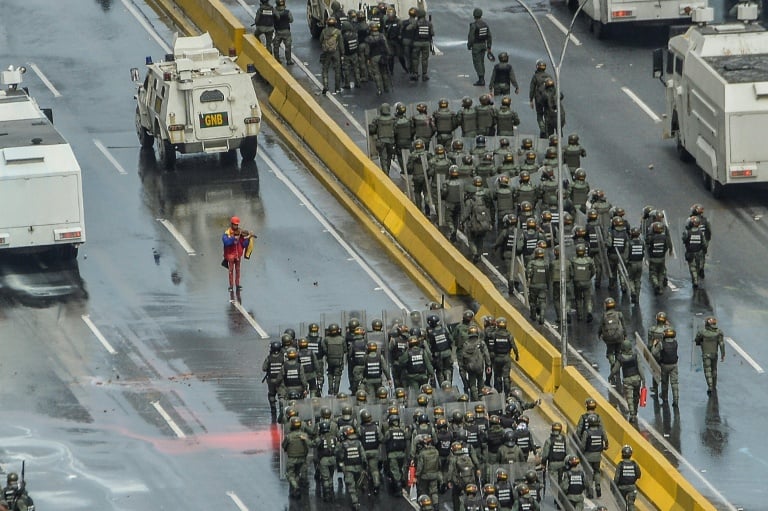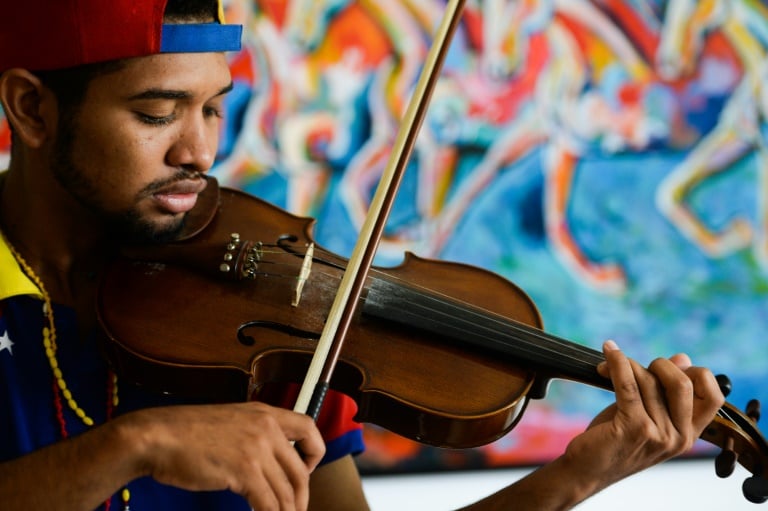Sars swallows petrol attendant’s two-pot payout after IRP5 mistake
Shortly after emerging from three weeks in prison, Arteaga, a 23-year-old who used his music as a form of protest, told AFP that it hurts him to see “everything so calm” in the once-raucous streets.
“When I got out of jail, the streets were completely empty, people walking around as if nothing had happened,” he says. “For me it was a very low blow. I felt a lot of sadness and confusion.”
After four months of deadly opposition demonstrations demanding the departure of President Nicolas Maduro from power, the protesters have been left discouraged and frustrated by their leaders.
Water cannon, tear gas and sheer exhaustion have doused the dream of dislodging Maduro.
Even Arteaga’s violin has been silenced.
He had it — and himself — smashed up during the protests, only to return with a new one donated by well-wishers. But a court order now forbids him to play at protests, if ever they should resume.
“Every day I go out to the street even though I’m not allowed to play the violin,” he says. “I still haven’t accepted that the street protests have petered out.”

An opposition activist Wuilly Arteaga plays the violin in front of riot police during a protest against President Nicolas Maduro in Caracas, on May 24, 2017
The wave of protests from April to July left 125 dead and thousands wounded, with thousands more rounded up and thrown into prison.
“To those still inside, I still haven’t had the courage to tell them that there is no one on the streets anymore,” he says.
“I wouldn’t want them to discover the same reality as me when they get out, because that’s very painful.”
– Church music –
Arteaga shot from obscurity as a busker to the spotlight of global news when he was filmed playing the national anthem and other patriotic tunes in the chaos of the protests.
His passion for music was first sparked when his parents took him to join a Pentecostal church when he was nine.

Shortly after emerging from three weeks in prison, Arteaga, a 23-year-old who used his music as a form of protest, told AFP that it hurts him to see “everything so calm” in the once-raucous streets
“There was a keyboard there and I started playing melodies with one finger. They took me out of school, because according to that religion the world was ending so there was no need to study,” he recalls.
“The church was called the Restoration Tabernacle. It was forbidden to wear jeans, have cellphones or television.
“My father was one of the most fanatical members, but they threw him out because he got a declaration of love by text message from one of the sisters in the church and that was considered adultery.”
His mother was put in a psychiatric hospital.
– Violin addict –
Arteaga wasn’t allowed to play violin on the small farm his father later set up near the central city of Valencia, so he left for the capital Caracas in 2015. He busked on the streets and in the subway, and was selected to play with the Caracas Youth Orchestra.
“I became a violin addict,” he says.
“But two years after coming to Caracas the youth orchestra began to have internal political problems. The musicians were obliged to play at events where Maduro was speaking.
“I began to see that it was very false, because everyone was speaking badly of Maduro in the rehearsals, but still they smiled when he greeted the orchestra.”
Arteaga joined the opposition protests when another violinist, Armando Canizales, was killed during a demonstration.
“I felt completely powerless, so I went to play the violin at his funeral,” he recalls.
As his fame grew, the government became fearful that he was becoming a symbol of the protest movement internationally and accused him of promoting violence.
“I’ve never promoted violence. Everything I have done has been because I want a better country,” he says.
“I’ve spent a lot of time on the street and I know the needs there are.”
Download our app and read this and other great stories on the move. Available for Android and iOS.